Gardening in Ringwood East: Transform Your Outdoor Space
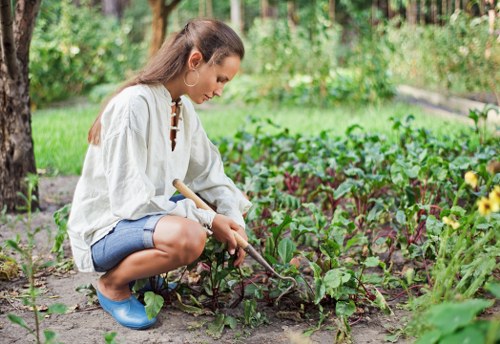
Gardening in Ringwood East offers residents the perfect opportunity to create beautiful, thriving outdoor spaces. Nestled in the heart of Melbourne’s eastern suburbs, Ringwood East is renowned for its lush greenery and vibrant community gardens. Whether you’re a seasoned gardener or a beginner looking to cultivate your first garden, this area provides all the resources and inspiration you need.
With a diverse climate and fertile soil, Ringwood East is ideal for a variety of plants, from colorful perennials to sturdy shrubs and trees. The local community is passionate about sustainability and eco-friendly gardening practices, making it easier for you to adopt green methods in your own garden. Additionally, numerous local nurseries and gardening centers offer a wide range of plants, tools, and expert advice to help you achieve your gardening goals.
One of the standout features of gardening in Ringwood East is the abundance of community spaces and parks that provide inspiration and support for gardeners of all levels. These public gardens showcase innovative landscaping ideas and native plant species, encouraging residents to incorporate these elements into their private gardens. Participating in community gardening events is also a great way to meet fellow enthusiasts and share tips and techniques.
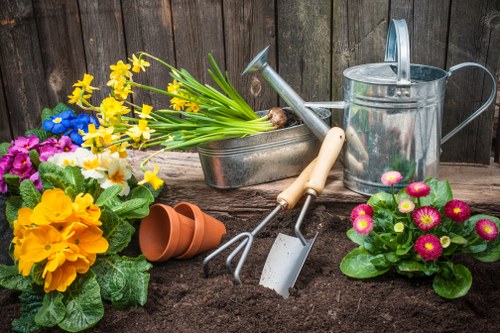
Getting Started with Your Garden
Starting a garden in Ringwood East is an exciting journey that begins with careful planning and preparation. Here are some essential steps to help you get started:
1. Assess Your Space
Before you begin planting, evaluate the available space in your garden. Consider factors such as sunlight exposure, soil quality, and drainage. Ringwood East gardens typically benefit from ample sunlight, but it’s important to identify shaded areas and plan accordingly.
2. Choose the Right Plants
Select plants that thrive in the local climate. Native plants are an excellent choice as they are well-adapted to the region’s conditions and require less maintenance. Popular choices in Ringwood East include kangaroo paws, grevilleas, and eucalyptus trees.
3. Prepare the Soil
Healthy soil is the foundation of a successful garden. Test your soil’s pH and nutrient levels, and amend it as necessary with compost or other organic matter. Good soil preparation ensures that your plants have the nutrients they need to grow strong and healthy.
4. Plan Your Layout
Design your garden layout by grouping plants with similar needs together. Consider factors such as height, color, and texture to create a visually appealing arrangement. Planning ahead helps maximize space and ensures that each plant has enough room to thrive.
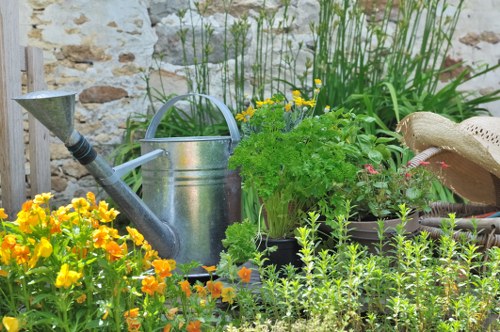
Essential Gardening Tools and Supplies
Having the right tools and supplies is crucial for maintaining a beautiful garden. Here are some must-have items for gardeners in Ringwood East:
- Hand Tools: Trowels, pruners, and cultivators are essential for planting and maintaining your garden.
- Watering Equipment: A reliable hose, watering can, and sprinkler system ensure your plants receive adequate hydration.
- Soil Amendments: Compost, mulch, and organic fertilizers improve soil health and promote plant growth.
- Protective Gear: Gloves, hats, and knee pads protect you while gardening.
- Storage Solutions: Shelves, bins, and tool sheds help keep your tools organized and easily accessible.
Choosing Quality Tools
Invest in high-quality tools that are durable and comfortable to use. Reliable tools not only make gardening tasks easier but also last longer, saving you money in the long run. Local gardening centers in Ringwood East offer a variety of tools to suit different needs and budgets.
Maintenance Tips
Proper maintenance of your gardening tools extends their lifespan. Clean your tools after each use, sharpen blades regularly, and store them in a dry place to prevent rust and corrosion. Well-maintained tools ensure that your gardening experience is smooth and enjoyable.
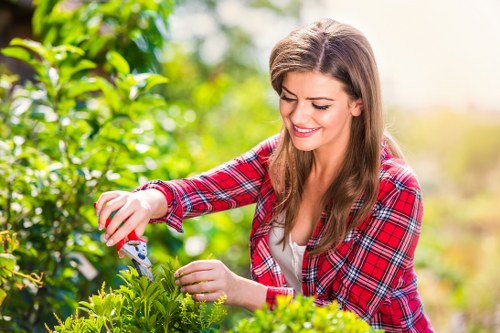
Seasonal Gardening Tips
Gardening in Ringwood East involves understanding the seasonal changes and adjusting your gardening practices accordingly. Here are some tips to help you navigate each season:
Spring
- Planting: This is the perfect time to plant new flowers, vegetables, and shrubs.
- Soil Preparation: Add compost and mulch to enrich the soil.
- Pruning: Trim back any dead or overgrown branches to encourage healthy growth.
Summer
- Watering: Ensure your plants receive adequate water during the hot months.
- Pest Control: Monitor for pests and use eco-friendly pesticides if necessary.
- Weeding: Regularly remove weeds to prevent them from competing with your plants.
Autumn
- Harvesting: Collect ripe vegetables and fruits from your garden.
- Planting Bulbs: Plant bulbs for flowers that will bloom in the spring.
- Leaf Management: Rake fallen leaves and use them as mulch or compost.
Winter
- Protection: Protect sensitive plants from frost and extreme cold.
- Planning: Plan your garden layout and make a list of plants for the upcoming season.
- Maintenance: Clean and store your gardening tools properly.
Adapting to Climate
Ringwood East experiences a temperate climate with distinct seasons. Adapting your gardening techniques to these seasonal changes ensures that your garden remains healthy and vibrant throughout the year. Utilize local weather forecasts to plan your gardening activities effectively.
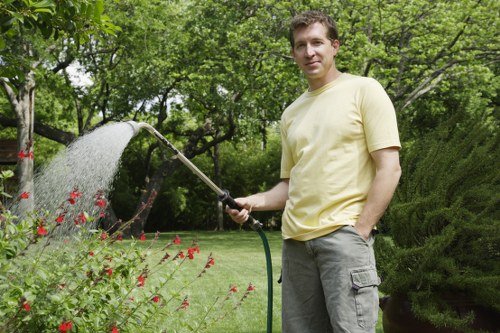
Choosing the Right Plants for Ringwood East
Selecting the appropriate plants is key to creating a thriving garden in Ringwood East. Consider the local climate, soil type, and available sunlight when making your choices. Here are some popular plant options:
Native Plants
Native plants are well-suited to the local environment and require less maintenance. They also support local wildlife and promote biodiversity.
- Kangaroo Paw
- Grevillea
- Eucalyptus
- Wattles
- Bottlebrush
Flowering Plants
Adding flowering plants brings color and vibrancy to your garden. They can be chosen based on their blooming seasons to ensure year-round interest.
- Roses
- Lavender
- Sunflowers
- Marigolds
- Petunias
Vegetables and Herbs
Growing your own vegetables and herbs is both rewarding and practical. Fresh produce enhances your meals and reduces grocery bills.
- Tomatoes
- Carrots
- Spinach
- Basil
- Parsley
Fruit Trees
Fruit trees not only provide delicious yields but also add structure and beauty to your garden. They require proper care and pruning to ensure healthy growth and fruit production.
Local Gardening Services in Ringwood East
For those who prefer professional assistance, Ringwood East boasts a variety of gardening services. These professionals offer expertise in garden design, maintenance, landscaping, and more. Hiring a local gardener ensures that your garden is tailored to the specific conditions of the area.
Garden Design and Landscaping
Professional garden designers can help you create a customized layout that suits your preferences and lifestyle. They consider factors such as space, light, and plant selection to design a cohesive and functional garden.
Maintenance Services
Regular maintenance is essential for keeping your garden in pristine condition. Services include mowing, pruning, weeding, fertilizing, and pest control. Professional maintenance ensures that your garden remains healthy and attractive throughout the year.
Specialized Services
Specialized services such as irrigation system installation, soil testing, and organic gardening consultations are also available. These services help enhance the efficiency and sustainability of your garden.
Choosing the Right Service Provider
When selecting a gardening service in Ringwood East, consider factors such as experience, reputation, and range of services offered. Reading reviews and asking for recommendations can help you find a reliable and skilled gardener.
Cost Considerations
The cost of gardening services varies based on the scope of work and the expertise of the provider. It’s important to obtain quotes and compare services to find an option that fits your budget while meeting your gardening needs.
Emergency Gardening Services
Unexpected issues such as plant diseases, pest infestations, or severe weather damage may require immediate attention. Emergency gardening services are available in Ringwood East to address these problems promptly, minimizing damage and restoring your garden’s health.
Benefits of Hiring Professionals
Hiring professional gardening services saves you time and effort, ensuring that your garden receives expert care. Professionals bring knowledge and experience that can enhance the beauty and functionality of your outdoor space.
Sustainable Practices
Many local gardening services in Ringwood East prioritize sustainable practices, such as using organic fertilizers, promoting native plants, and implementing water-saving irrigation systems. These practices contribute to a healthier environment and a more resilient garden.
Community and Resources in Ringwood East
Ringwood East offers a wealth of community resources and events that support gardeners. Engaging with the local community can provide inspiration, knowledge, and a sense of camaraderie among gardening enthusiasts.
Community Gardens
Community gardens are shared spaces where residents can cultivate their own plots. These gardens foster a sense of community and provide an opportunity to learn from fellow gardeners. They are also a great way to access resources such as tools, seeds, and gardening tips.
Local Workshops and Classes
Numerous workshops and classes are held throughout the year, covering topics like composting, plant propagation, and sustainable gardening. Participating in these educational opportunities enhances your gardening skills and keeps you updated on the latest trends and techniques.
Gardening Clubs and Groups
Joining a gardening club or group connects you with like-minded individuals who share your passion for gardening. These groups often organize events, plant swaps, and collaborative projects that enrich your gardening experience.
Online Communities
In addition to in-person resources, online communities and forums provide a platform for exchanging ideas and seeking advice. Websites and social media groups dedicated to Ringwood East gardening offer a wealth of information and support.
Local Gardening Publications
Local magazines, newsletters, and blogs focus on gardening in Ringwood East, providing articles, tips, and profiles of local gardens and gardeners. Staying informed through these publications helps you stay connected to the gardening scene in your area.
Garden Tours and Open Days
Garden tours and open days allow you to explore stunning gardens in Ringwood East and gain inspiration for your own space. These events showcase diverse garden styles and innovative landscaping ideas, offering valuable insights for your gardening projects.
Volunteer Opportunities
Volunteering in community gardens or local green projects is a rewarding way to contribute to the community while honing your gardening skills. It also provides a sense of accomplishment and connection to the environment.
10-15 Closest Areas to Ringwood East for Gardening Services
Adjacent to Ringwood East are several suburbs that share similar gardening climates and offer local gardening services. Here are some of the closest areas, each with its unique features:
- Ringwood: Just west of Ringwood East, Ringwood offers extensive gardening resources and nurseries.
- Bayswater North: Known for its sprawling parks and community gardens.
- Croydon South: Features beautiful residential gardens and landscaping services.
- Heathmont: Offers a mix of native and exotic plants suitable for local gardens.
- Forest Hill North: Renowned for its lush greenery and garden design experts.
- Wantirna South: Home to several botanical gardens and gardening clubs.
- Glenvale: Offers specialized horticultural services and organic gardening options.
- Tunstall: Known for its vibrant flower beds and community garden projects.
- Wonga Park: Features extensive gardening stores and plant nurseries.
- Kallista: Offers boutique gardening services and unique plant selections.
- Montrose: Known for its eco-friendly gardening practices and sustainable landscaping.
- Four Hills: Features a variety of gardens and local gardening events.
- Forest Hill: Offers premium gardening services and high-quality plant varieties.
- Ringwood North: Known for its diverse garden styles and professional landscaping services.
- Vermont South: Provides comprehensive gardening solutions and community gardening spaces.
Unique Features of Nearby Areas
- Ringwood: Large gardening centers and extensive plant selections.
- Bayswater North: Numerous public parks and community garden initiatives.
- Croydon South: High-quality landscaping services and bespoke garden designs.
- Heathmont: Variety of native plants and sustainable gardening practices.
- Forest Hill North: Expertise in garden design and maintenance services.
- Wantirna South: Access to botanical gardens and educational gardening programs.
- Glenvale: Specialized in organic gardening and eco-friendly solutions.
- Tunstall: Active community involvement in gardening projects.
- Wonga Park: Extensive range of gardening supplies and professional services.
- Kallista: Unique plant varieties and personalized gardening assistance.
- Montrose: Focus on sustainable landscaping and green gardening techniques.
- Four Hills: Diverse garden styles and frequent local gardening events.
- Forest Hill: Premium horticultural services and high-end plant options.
- Ringwood North: Diverse plant selections and professional landscaping expertise.
- Vermont South: Comprehensive gardening services and supportive community spaces.
Proximity to Ringwood East
All these areas are in close proximity to Ringwood East, making it convenient for residents to access a wide range of gardening services and resources. Whether you’re looking for specialized plants, professional maintenance, or community support, these nearby suburbs provide ample options to enhance your gardening experience.
Leveraging Local Expertise
Utilizing the expertise and resources available in these neighboring areas allows you to create a more diverse and resilient garden. Collaborating with local gardeners and service providers can lead to innovative gardening solutions tailored to the unique conditions of Ringwood East and its surroundings.
Enhancing Your Garden’s Sustainability
Sustainability is a key aspect of modern gardening, and Ringwood East gardeners are increasingly adopting eco-friendly practices. Implementing sustainable techniques not only benefits the environment but also contributes to the long-term health of your garden.
Composting
Composting organic waste transforms kitchen scraps and garden trimmings into nutrient-rich soil. This reduces waste and enhances soil fertility, promoting healthier plant growth.
Rainwater Harvesting
Collecting and using rainwater for your garden reduces reliance on municipal water sources. It’s an efficient way to ensure your plants receive consistent hydration, especially during dry periods.
Mulching
Applying mulch to your garden beds helps retain moisture, suppress weeds, and regulate soil temperature. Organic mulches also decompose over time, enriching the soil with essential nutrients.
Native Plant Selection
Choosing native plants supports local ecosystems and biodiversity. Native species are adapted to the local climate and soil conditions, requiring less water and maintenance.
Integrated Pest Management
Integrated Pest Management (IPM) involves using a combination of biological, cultural, and mechanical methods to control pests. This approach minimizes the need for chemical pesticides, promoting a healthier garden environment.
Energy-Efficient Practices
Incorporating energy-efficient practices, such as using solar-powered garden lighting or energy-saving irrigation systems, reduces your garden’s carbon footprint and operational costs.
Community Involvement
Participating in community sustainability initiatives, such as tree planting or local clean-up events, fosters a sense of collective responsibility for the environment. It also provides opportunities to learn and implement sustainable gardening practices.
Green Certification
Some local gardening services offer green certification for sustainable gardens. Obtaining certification can enhance your garden’s reputation and demonstrate your commitment to environmental stewardship.
Resource Conservation
Practices like reducing water waste, recycling garden materials, and using renewable resources contribute to overall sustainability. These efforts ensure that your garden remains productive and environmentally friendly for years to come.
Maximizing Space in Your Garden
Whether you have a large backyard or a small balcony, maximizing space is essential for creating an efficient and attractive garden in Ringwood East. Here are some strategies to optimize your gardening area:
Vertical Gardening
Vertical gardening involves growing plants upward, utilizing walls, trellises, and other vertical structures. This method saves space and adds visual interest to your garden.
- Living Walls: Install a vertical garden to display a variety of plants in a compact space.
- Trellises and Arbors: Use trellises for climbing plants like beans and roses.
- Shelves and Racks: Implement shelves for potted plants and herbs.
Container Gardening
Container gardening is ideal for small spaces or areas with poor soil quality. Using pots, planters, and raised beds allows you to control soil conditions and easily move plants as needed.
- Planters: Choose a variety of sizes and styles to accommodate different plants.
- Raised Beds: Create raised garden beds for better drainage and easier access.
- Window Boxes: Utilize window spaces for growing herbs and small flowers.
Multi-Level Gardening
Incorporating multiple levels in your garden design adds depth and maximizes space. Use elevated platforms, stacked planters, and tiered shelving to create a dynamic and organized garden layout.
Compact Plant Varieties
Select compact or dwarf plant varieties that require less space and are suitable for small gardens. These plants can thrive in confined areas without compromising on beauty or productivity.
Functional Landscaping
Incorporate functional elements into your garden design, such as seating areas, pathways, and storage solutions. These features enhance the usability of your garden while maintaining an organized appearance.
Smart Layout Planning
Carefully plan your garden layout to ensure efficient use of space. Group plants with similar needs together and consider pathways for easy access and maintenance.
Lighting and Accessibility
Proper lighting enhances the functionality and aesthetics of your garden. Ensure that walkways are well-lit and that plants are easily accessible for watering and care.
Maximizing Light Exposure
To make the most of available sunlight, arrange plants according to their light requirements. Place sun-loving plants in the brightest areas and shade-tolerant plants in less exposed spots.
Reflective Surfaces
Using reflective surfaces like mirrors or white walls can amplify natural light, creating a brighter and more inviting garden space.
Storage Solutions
Efficient storage for gardening tools and supplies helps keep your garden tidy and organized. Utilize storage benches, sheds, and hanging organizers to maximize space.
Beautifying Your Garden with Decorative Elements
Adding decorative elements to your garden enhances its beauty and personalizes the space. These features can create focal points, add color, and provide functionality.
Garden Art and Sculptures
Incorporate garden art and sculptures to add character and visual interest. Choose pieces that complement your garden’s style and theme.
- Statues: Classic statues can serve as elegant focal points.
- Metal Art: Modern metal sculptures add a contemporary touch.
- Mosaic Tiles: Use mosaic designs for pathways or garden walls.
Water Features
Water features like fountains, ponds, and birdbaths bring tranquility and life to your garden. The sound of running water can create a relaxing atmosphere and attract wildlife.
- Fountains: Choose from tiered, wall-mounted, or free-standing designs.
- Ponds: Create a small pond to support aquatic plants and fish.
- Birdbaths: Attract birds with a decorative bath for drinking and bathing.
Lighting
Outdoor lighting not only enhances the aesthetic appeal of your garden but also extends its usability into the evening hours. Choose from various lighting options to highlight garden features and ensure safety.
- String Lights: Add a warm glow to seating areas and pathways.
- Spotlights: Illuminate specific plants or architectural elements.
- Solar Lights: Energy-efficient and easy to install lighting options.
Lighting Tips
Strategically place lights to highlight key areas of your garden. Use timers or smart lighting systems to automate your lighting schedule and conserve energy.
Seating and Relaxation Areas
Create inviting spaces for relaxation and enjoyment. Incorporate benches, chairs, and hammocks to provide comfortable spots for reading, socializing, or simply enjoying the garden’s beauty.
- Garden Benches: Classic benches offer a permanent seating solution.
- Outdoor Chairs: Flexible seating options that can be moved as needed.
- Hammocks: Perfect for creating a lounging area.
Pathways and Walkways
Pathways guide visitors through your garden and add structure to the overall design. Choose materials that complement your garden’s aesthetic and provide easy access to different areas.
- Stone Pathways: Durable and natural-looking paths.
- Gravel Walkways: Affordable and easy to install.
- Brick Paths: Classic and elegant walkway options.
Edging Solutions
Use edging materials to define garden beds and pathways. Edging helps prevent soil erosion and adds a finished look to your garden layout.
Fencing and Privacy Screens
Fences and privacy screens provide boundaries and enhance the seclusion of your garden. They can also serve as supports for climbing plants and vertical gardens.
- Wooden Fences: Traditional fencing that adds warmth and character.
- Metal Fences: Durable and low-maintenance options.
- Lattice Screens: Ideal for creating privacy while allowing light and air to pass through.
Choosing the Right Materials
Select materials that are appropriate for your garden’s style and climate. Consider factors such as durability, maintenance requirements, and aesthetic appeal when choosing fencing and decorative elements.
Planters and Pots
Planters and pots are versatile additions to any garden, allowing you to experiment with different plant arrangements and styles. They are particularly useful for container gardening and small spaces.
- Ceramic Pots: Elegant and available in various colors and designs.
- Terracotta Planters: Classic and breathable for plant roots.
- Metal Containers: Modern and durable options for contemporary gardens.
Creative Arrangements
Arrange planters in groups or patterns to create visually appealing displays. Mix and match different sizes, shapes, and colors to add interest and depth to your garden.
Maintaining a Healthy Garden
Maintaining a healthy garden requires regular care and attention. Proper maintenance ensures that your plants thrive and your garden remains beautiful throughout the seasons.
Watering Techniques
Effective watering is crucial for plant health. Here are some tips for proper watering:
- Deep Watering: Water deeply to encourage strong root growth.
- Morning Schedule: Water in the early morning to reduce evaporation and prevent fungal diseases.
- Drip Irrigation: Use drip systems to deliver water directly to the roots, conserving water and reducing waste.
Pruning and Trimming
Regular pruning and trimming keep your plants healthy and promote new growth. Remove dead or diseased branches and shape plants to maintain their structure.
Deadheading
Deadheading involves removing spent flowers to encourage continuous blooming and prevent seed formation.
Weed Control
Weeds compete with your plants for nutrients and water. Implementing effective weed control strategies helps maintain a pristine garden.
- Manual Weeding: Hand-pull weeds to prevent them from spreading.
- Mulching: Apply mulch to suppress weed growth and retain soil moisture.
- Organic Herbicides: Use eco-friendly herbicides to manage persistent weeds.
Fertilizing Your Garden
Providing your plants with essential nutrients through fertilization supports vigorous growth and vibrant blooms. Choose fertilizers based on your plants’ specific needs.
Organic Fertilizers
Organic fertilizers, such as compost and manure, enhance soil fertility without harmful chemicals. They improve soil structure and promote beneficial microbial activity.
Pest and Disease Management
Protecting your garden from pests and diseases is essential for maintaining plant health. Implement preventive measures and address issues promptly to minimize damage.
- Regular Inspections: Check plants regularly for signs of pests or diseases.
- Natural Predators: Encourage beneficial insects like ladybugs and spiders to control pest populations.
- Proper Sanitation: Remove infected plants and debris to prevent the spread of diseases.
Integrated Pest Management
Adopt Integrated Pest Management (IPM) practices to sustainably manage pests. Combining biological, cultural, and mechanical controls reduces reliance on chemical pesticides.
Soil Health
Maintaining healthy soil is fundamental to a thriving garden. Practices like crop rotation, cover cropping, and adding organic matter improve soil structure and fertility.
Soil Testing
Regular soil testing helps you understand nutrient levels and pH, enabling you to make informed decisions about soil amendments and planting strategies.
Plant Support Systems
Providing support for plants, especially those that are tall or vining, ensures they grow properly and reduces the risk of breakage.
- Stakes: Support tall plants and prevent them from toppling over.
- Trellises: Guide the growth of climbing plants like peas and beans.
- Cages: Offer support for bushy plants and prevent sprawling.
Gardening for Wildlife
Caring for your garden in Ringwood East can also support local wildlife, creating a harmonious ecosystem. Attracting beneficial creatures enhances the biodiversity and health of your garden.
Attracting Pollinators
Pollinators like bees, butterflies, and birds play a crucial role in plant reproduction. Creating a pollinator-friendly garden supports these essential creatures.
- Flower Selection: Choose plants that bloom at different times to provide a continuous nectar source.
- Water Sources: Provide shallow water dishes or birdbaths for hydration.
- Nectar Plants: Incorporate plants like lavender, sunflowers, and echinacea to attract pollinators.
Habitat Creation
Create habitats for beneficial wildlife by adding features like birdhouses, bat boxes, and insect hotels. These structures provide shelter and nesting sites for various animals.
Bird-Friendly Features
Include bird feeders, nesting boxes, and native plants to create an inviting environment for birds. This not only supports local bird populations but also adds life and movement to your garden.
Supporting Predators
Encourage natural predators like ladybugs, spiders, and frogs to control pest populations. Providing habitat and food sources for these creatures helps maintain a balanced ecosystem.
Water Gardens
Water gardens attract amphibians and insects, adding another layer of biodiversity. Incorporate plants like water lilies and reeds to create a thriving aquatic environment.
Plant Diversity
A diverse array of plants supports a wider range of wildlife. Mix annuals, perennials, shrubs, and trees to provide various habitats and food sources.
Native vs. Non-Native Plants
While non-native plants can add beauty and variety, native plants are especially beneficial for local wildlife. Striking a balance between native and non-native species enhances your garden’s ecological value.
Eco-Friendly Practices
Adopting eco-friendly practices in your gardening routines supports a healthy environment and wildlife. Reduce chemical usage, recycle garden waste, and conserve water to create a sustainable garden.
Organic Gardening
Organic gardening methods focus on natural processes and materials, avoiding synthetic chemicals. This approach benefits both plants and wildlife, fostering a healthier ecosystem.
Creating Shelter
Provide shelters such as rock piles, log piles, and dense shrubbery to offer hiding places and nesting sites for wildlife. These shelters protect animals from predators and harsh weather conditions.
Firewood Habitats
Including logs and branches in your garden creates habitats for insects and small mammals. These firewood habitats are essential for maintaining biodiversity.
Seasonal Considerations
Different seasons support different wildlife. Plan your garden to provide year-round resources and shelters, ensuring that your garden remains a sanctuary for wildlife throughout the year.
Winter Wildlife Support
Provide food and shelter for wildlife during winter months by maintaining bird feeders and ensuring evergreen plants are available as habitat and food sources.
Final Thoughts on Gardening in Ringwood East
Gardening in Ringwood East is a fulfilling and rewarding endeavor that allows you to create a beautiful and sustainable outdoor space. With the right planning, resources, and community support, you can transform your garden into a thriving oasis that reflects your personal style and enhances the local environment.
Embrace the diverse plant life, utilize eco-friendly practices, and engage with the vibrant gardening community to maximize your gardening success. Whether you’re aiming for a lush vegetable garden, a colorful flower display, or a serene sanctuary for wildlife, Ringwood East offers everything you need to achieve your gardening dreams.
Start Your Gardening Journey Today
Ready to transform your outdoor space? Contact us today to book your gardening service and experience the best of gardening in Ringwood East. Let our experts help you create the garden of your dreams.
Stay Connected
Join local gardening groups, attend workshops, and participate in community events to stay inspired and informed. Your garden is a reflection of your passion and dedication, and with the right support, it can flourish beautifully.
Book Your Service Now
Don’t wait to bring your gardening vision to life. Book your service now and take the first step towards a stunning and sustainable garden in Ringwood East.
